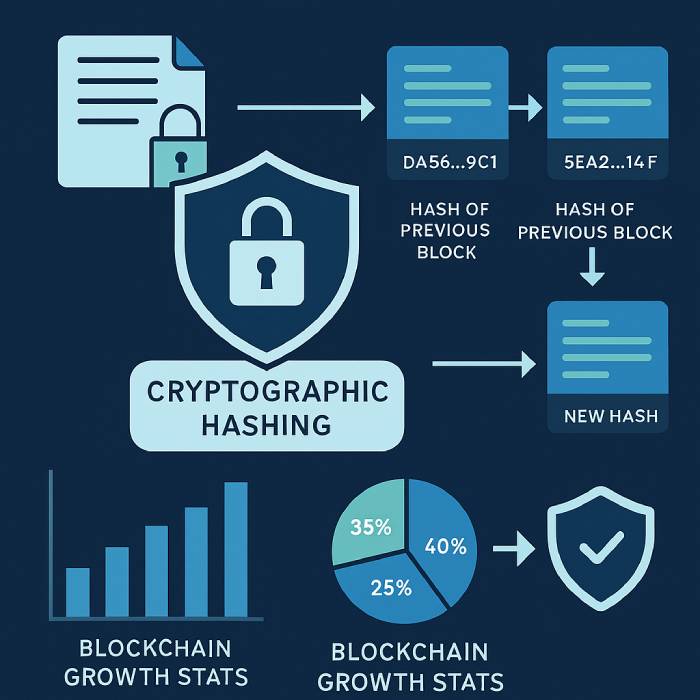How Hash Helps Secure Blockchain Technology

Data breaches and cyber risks are becoming more and more important as digital transactions grow more common. Blockchain technology is at the heart of this global shift toward decentralized systems. But what makes blockchain the best approach to keep data safe? The hash is the answer to this question.
The hash, which is a unique digital signature made by a hash function, is the most important part of blockchain security. You may think of it as a fingerprint that stands for a group of data. If you try to change the original input, you will get a completely new hash, which means that the data is no longer safe.
In this article, we'll talk about the basics of hashing in blockchain, how hash functions help keep blockchain systems safe, and expert opinions and global trends that show that blockchain hashing isn't simply a feature—it's the core of blockchain security.
Understanding the Fundamentals of Hashing in Blockchain
Before you can grasp hashes in blockchain, you need to know what a blockchain is. Imagine it as a huge shared record, or ledger, that is kept on many computers all around the world. A blockchain system is different from typical systems because it spreads out the data so that everyone has a full copy.
A hash, which is a code created by a secure hashing mechanism, is in every block of data in a blockchain. These hash values are one-of-a-kind and come from the content of the block. A hash will be radically different if even the smallest change is made to the input data. SHA-256 and other hash functions used in blockchain technology are one-way math problems. This means that it is almost impossible to get the original input back from its hash, which is a big part of what makes blockchain safe.
The Fundamentals of Blockchain Hashing:
- Consistency: The same input data always generates the same hash value.
- Sensitivity: Changing even one character in the data creates a completely different hash.
- Irreversibility: You cannot deduce the original data from the hash output.
These traits make hashes indispensable elements of blockchain technology and ensure the integrity and security of the blockchain.

How a Hash Function Helps in Securing Blockchain Technology
In a blockchain network, blocks are connected to each other via the hash of the block that came before them. Each new block that is added to the blockchain contains its own hash and the hash of the block that came before it. This design makes a chain where each block relies on the one before it.
The hash of a block changes whenever someone tries to modify its data. The link to the following block is broken by that modification, which now has the old hash. You would have to modify the hash in every block after this one to hide the tampering. This is almost unfeasible on a working blockchain network with hundreds of nodes.
This mechanism is what makes the blockchain secure. Here’s how it works:
- Block contains: input data, timestamp, and the hash of that block.
- Hashing the block: a hash function processes this input to create a unique hash value.
- New block to the chain: the new block includes its hash and the previous block’s hash.
- Tampering protection: any change in data results in a different hash, alerting the network.
Hash functions like SHA-256 are widely used in blockchain due to their high reliability and efficiency. The result — a 256-bit hash — plays a central role in securing blockchain technology.
Expert Insights: The Role of Hash Algorithms in Blockchain Security
Dr. Lisa Wu, a blockchain researcher at MIT, states: "A hash is not just a digital signature — it's a mathematical lock that guards every transaction on the blockchain. Without it, blockchain wouldn't be trustworthy."
Jacob Holt, CTO of ChainCore Solutions, emphasizes: "The use of cryptographic hash functions ensures that every block in a blockchain contains not only the data but proof of that data's origin and authenticity. That’s the future of data integrity."
Real-World Benefits of Blockchain Hashing
There are several reasons why organizations are adopting blockchain and secure hashing:
- Blockchain security: Hashes make tampering detectable and practically impossible without affecting every subsequent block.
- Data integrity: Each block in a blockchain contains a hash that verifies the content and maintains the chain’s continuity.
- Transparency and decentralization: Everyone in the network has access to the full blockchain, increasing trust and reducing fraud.
- Efficiency: Blockchain systems reduce the need for intermediaries, cutting costs and speeding up transactions.
- Traceability: The hash of each block ensures a complete history of any asset or action.
More than 560 million people use blockchain services, according to data from 2025. There are more than 85 million active blockchain wallets, and big networks like Bitcoin handle more than 472,000 transactions every day. Every day, TRON handles more than 8 million transactions. Secure hashing is certainly a key part of current data infrastructure, since more than 80% of Fortune 500 organizations use blockchain in some way.
Looking Ahead: How Secure Hashing Will Continue Securing Blockchain Systems
More improved secure hashing methods will be used to build the blockchain of the future. Hash functions like SHA-256 will still be very important for keeping the blockchain safe from fraud, mistakes, and cyberattacks.
By 2025, daily stablecoin transactions will reach more than $20 billion, and tokenized assets will be prevalent in real estate and finance. The importance of secure hashing in keeping data authentic will become more important as regulatory frameworks catch up.
Conclusion: Why Hash Functions Are Core to Blockchain Security
Blockchain technology has changed the way we think about trust and security. The hash is at the heart of it all. The hash makes blockchain technology safer by establishing a clear, unchangeable, and verifiable digital trail.
Blockchain is a system that can't be changed because it links the hash of each block to the next one. In a society that isn't centralized, this makes blockchain a safe and dependable means for people to share information, keep track of who owns what, and develop trust.
Hashing is what maintains the blockchain safe and makes sure that it works. It does this by creating a chain reaction that keeps the blockchain safe.




